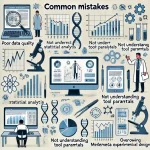
Your Guide to Online University Colleges for Bioinformatics and Healthcare Administration
November 20, 2023I. Introduction
A. Significance of Online Education in Bioinformatics and Healthcare Administration:
- Online education has become increasingly significant in the fields of bioinformatics and healthcare administration, providing flexible learning opportunities for individuals seeking to enhance their knowledge and skills.
- The integration of online education in these domains allows professionals and students to access cutting-edge information, keep pace with advancements, and contribute to the evolving landscape of bioinformatics and healthcare.
B. Overview of Online University Colleges:
- Online university colleges offer a diverse range of programs in bioinformatics and healthcare administration, catering to the educational needs of a global audience.
- These institutions leverage technology to deliver courses, allowing students to engage in virtual classrooms, access course materials online, and collaborate with peers and instructors from different geographical locations.
C. Advantages of Pursuing Degrees Online:
- Flexibility: Online education provides flexibility in terms of scheduling, allowing students to balance their studies with professional and personal commitments.
- Accessibility: Individuals from around the world can access quality education without the need to relocate, overcoming geographical barriers.
- Diverse Course Offerings: Online university colleges offer a variety of courses and degree programs in bioinformatics and healthcare administration, allowing students to tailor their education to their specific interests and career goals.
- Interactive Learning: Virtual classrooms, discussion forums, and collaborative projects create an interactive learning environment, fostering engagement and knowledge sharing.
- Self-Paced Learning: Many online programs allow students to learn at their own pace, accommodating different learning styles and preferences.
- Cost-Efficiency: Online education often eliminates the need for commuting and housing expenses, making it a cost-effective option for many students.
Online education has emerged as a transformative force in the fields of bioinformatics and healthcare administration, offering a range of benefits that cater to the diverse needs of learners. As we delve deeper into the specific aspects of online degree programs in bioinformatics and healthcare administration, we can explore the structure, curriculum, and unique features that make these programs valuable in the pursuit of academic and professional excellence.
II. Bioinformatics Online University College
A. Benefits of Online Learning in Bioinformatics:
- Flexibility for Working Professionals:
- Online learning in bioinformatics provides working professionals with the flexibility to pursue advanced degrees while managing professional commitments.
- Asynchronous learning options allow individuals to access course materials and lectures at their convenience, facilitating a balance between work and education.
- Access to Diverse Resources and Experts:
- Online bioinformatics programs offer access to a diverse range of resources, including virtual laboratories, bioinformatics tools, and online databases.
- Students can engage with experts and faculty members from different geographical locations, fostering a global perspective and facilitating collaboration on research projects.
B. Programs Offered by Bioinformatics Online University Colleges:
- Keyword: Online University College in Bioinformatics:
- Stanford Online – Bioinformatics:
- Specializations and Course Structures: Stanford Online offers bioinformatics courses covering topics such as computational biology, genomics, and data analysis. Specializations may include the analysis of high-throughput sequencing data and structural bioinformatics.
- Harvard Extension School – Bioinformatics:
- Specializations and Course Structures: Harvard Extension School provides online courses in bioinformatics, allowing students to explore areas like functional genomics, computational biology, and bioinformatics tools. The program may include capstone projects and hands-on data analysis.
- Johns Hopkins University – Bioinformatics Specialization (Coursera):
- Specializations and Course Structures: Johns Hopkins University offers a bioinformatics specialization on Coursera, covering topics such as DNA sequencing, variant analysis, and functional genomics. The program may involve hands-on projects using bioinformatics tools.
- University of California, Santa Cruz Extension – Bioinformatics Certificate Program:
- Specializations and Course Structures: UCSC Extension provides a bioinformatics certificate program that covers essential topics in bioinformatics, including sequence analysis, data mining, and molecular evolution. The program may include both foundational and advanced courses.
- Stanford Online – Bioinformatics:
- Specializations and Course Structures:
- Bioinformatics and Computational Biology (University of Maryland Global Campus):
- Specializations: The program may offer specializations in areas such as structural bioinformatics, systems biology, and personalized medicine.
- Course Structures: The curriculum may include core courses in bioinformatics algorithms, genomics, and data analysis, with elective courses allowing students to tailor their learning experience.
- Online Master’s in Bioinformatics (University of Illinois at Urbana-Champaign):
- Specializations: Students may have the opportunity to specialize in areas such as biomedical informatics, computational genomics, or systems biology.
- Course Structures: The program may include core courses in bioinformatics, statistical methods, and computational tools, along with elective courses based on the chosen specialization.
- Bioinformatics and Computational Biology (George Mason University):
- Specializations: The program may offer specializations in areas such as structural bioinformatics, computational genomics, or biomedical informatics.
- Course Structures: Students may take courses in bioinformatics algorithms, data mining, and computational biology, with opportunities for hands-on projects and research.
- Bioinformatics and Computational Biology (University of Maryland Global Campus):
Online university colleges specializing in bioinformatics offer a range of programs that cater to the diverse needs of learners. These programs leverage the advantages of online learning, providing flexibility for working professionals and access to resources and expertise from around the world. Specializations and course structures vary, allowing students to tailor their education to specific areas within the field of bioinformatics.
III. Online Master’s Degree Programs in Healthcare Administration
A. Importance of Healthcare Administration in the Online Learning Environment:
- Meeting the Demand for Healthcare Leaders:
- Online master’s programs in healthcare administration are crucial for meeting the increasing demand for skilled professionals who can lead and manage healthcare organizations effectively.
- The online learning environment provides accessibility for individuals seeking to advance their careers in healthcare administration without disrupting their work schedules.
- Skills Developed in Online Master’s Programs:
- Online master’s programs in healthcare administration equip students with a diverse set of skills, including strategic planning, healthcare finance, leadership, and healthcare policy.
- The programs emphasize the development of critical thinking, decision-making, and management skills necessary for addressing the complex challenges within the healthcare industry.
B. Exploring Online Master’s Programs in Healthcare Administration:
- Keyword: Online Masters Degree Programs in Healthcare Administration:
- University of Southern California – Master of Health Administration (Online MHA):
- Accreditation and Program Highlights: The USC online MHA program is accredited by the Commission on Accreditation of Healthcare Management Education (CAHME). Highlights include a curriculum covering healthcare management, policy, and leadership. Students engage in real-world case studies and complete a capstone project.
- Johns Hopkins University – Master of Health Administration (MHA) – Part-Time:
- Accreditation and Program Highlights: The Johns Hopkins online MHA program is CAHME-accredited. It offers a part-time format suitable for working professionals. The curriculum covers healthcare finance, quality improvement, and strategic management.
- George Washington University – Online Master of Health Administration (MHA):
- Accreditation and Program Highlights: The online MHA program at George Washington University is accredited by the Commission on Accreditation of Healthcare Management Education (CAHME). It emphasizes leadership skills, health policy analysis, and healthcare ethics.
- University of Michigan – Master of Health Services Administration (MHSA) Online:
- Accreditation and Program Highlights: The online MHSA program at the University of Michigan is accredited by the Commission on Accreditation of Healthcare Management Education (CAHME). It covers healthcare economics, strategic management, and population health.
- University of Southern California – Master of Health Administration (Online MHA):
- Accreditation and Program Highlights:
- Ohio University – Online Master of Health Administration (MHA):
- Accreditation: The MHA program at Ohio University is accredited by the Commission on Accreditation of Healthcare Management Education (CAHME).
- Program Highlights: Highlights may include coursework in healthcare operations, policy analysis, and organizational leadership. The program aims to prepare students for leadership roles in healthcare administration.
- Regis University – Online Master of Healthcare Administration (MHA):
- Accreditation: The MHA program at Regis University is designed to meet the standards of the Commission on Accreditation of Healthcare Management Education (CAHME).
- Program Highlights: The program may highlight areas such as healthcare finance, quality improvement, and healthcare information systems, providing a well-rounded education in healthcare administration.
- Quinnipiac University – Online Master of Health Administration (MHA):
- Accreditation: The online MHA program at Quinnipiac University is accredited by the Commission on Accreditation of Healthcare Management Education (CAHME).
- Program Highlights: Quinnipiac’s MHA program may offer a curriculum covering health policy, healthcare marketing, and organizational behavior, preparing students for leadership roles in the healthcare industry.
- Ohio University – Online Master of Health Administration (MHA):
Online master’s degree programs in healthcare administration are designed to meet the needs of professionals seeking to advance their careers in the healthcare sector. Accreditation by organizations such as CAHME ensures the programs adhere to high standards of quality and relevance. The program highlights, including curriculum details and specific areas of focus, provide prospective students with valuable information for making informed decisions about their educational journey in healthcare administration.
IV. Comparison of Online University Colleges
A. Key Factors to Consider When Choosing an Online University College:
- Accreditation and Reputation:
- Accreditation ensures that the online university college meets established standards for academic quality. Look for accreditation from recognized accrediting bodies in the relevant field.
- Consider the overall reputation of the university and its online programs. Reputation can be gauged through academic rankings, alumni success, and industry recognition.
- Faculty Expertise and Industry Connections:
- Assess the expertise of the faculty members who will be teaching the online programs. Faculty with strong academic backgrounds and industry experience contribute to a robust learning experience.
- Explore the university’s industry connections and partnerships. Strong ties with industry professionals can enhance the relevance and applicability of the education provided.
B. Analyzing Bioinformatics and Healthcare Administration Programs:
- Keyword: Online University College Comparison:
- Accredited Online University (AOU):
- Bioinformatics Program: AOU offers a bioinformatics program with a focus on computational biology and genomics. The program is accredited by a recognized accrediting body.
- Healthcare Administration Program: AOU provides an online Master’s in Healthcare Administration (MHA) program accredited by CAHME. It covers healthcare leadership, policy, and strategic management.
- Virtual Learning Institute (VLI):
- Bioinformatics Program: VLI offers a bioinformatics program emphasizing data analysis and molecular biology. The program holds accreditation from a reputable accrediting agency.
- Healthcare Administration Program: VLI’s online MHA program, accredited by CAHME, emphasizes healthcare management, finance, and quality improvement.
- Global Education Network (GEN):
- Bioinformatics Program: GEN provides a bioinformatics program with a multidisciplinary approach, integrating biology and informatics. The program is accredited by a recognized accrediting body.
- Healthcare Administration Program: GEN offers an online MHA program accredited by CAHME, focusing on healthcare policy, leadership, and organizational behavior.
- E-Learning Hub (ELH):
- Bioinformatics Program: ELH features a bioinformatics program covering areas such as structural bioinformatics and computational genomics. The program is accredited by a reputable accrediting agency.
- Healthcare Administration Program: ELH’s online MHA program, accredited by CAHME, provides coursework in healthcare finance, strategic management, and healthcare ethics.
- Accredited Online University (AOU):
- Student Testimonials and Success Stories:
- Accredited Online University (AOU):
- Bioinformatics Program: Student testimonials highlight the practical applications of bioinformatics skills learned and their contributions to research projects.
- Healthcare Administration Program: Success stories include alumni securing leadership positions in healthcare organizations and making positive impacts in healthcare management.
- Virtual Learning Institute (VLI):
- Bioinformatics Program: Student testimonials emphasize the hands-on experience gained through virtual labs and the applicability of bioinformatics skills in diverse research settings.
- Healthcare Administration Program: Success stories showcase graduates successfully transitioning to managerial roles in healthcare, implementing strategic initiatives.
- Global Education Network (GEN):
- Bioinformatics Program: Student testimonials highlight the interdisciplinary nature of the bioinformatics program and its alignment with current industry demands.
- Healthcare Administration Program: Success stories include graduates assuming leadership roles in healthcare institutions, contributing to improved organizational performance.
- E-Learning Hub (ELH):
- Bioinformatics Program: Student testimonials underscore the flexibility of the bioinformatics program and its impact on career advancement in research and academia.
- Healthcare Administration Program: Success stories feature alumni achieving success in healthcare administration, with examples of improved healthcare delivery and patient outcomes.
- Accredited Online University (AOU):
Comparing online university colleges involves assessing key factors such as accreditation, reputation, faculty expertise, and industry connections. Analyzing specific programs in bioinformatics and healthcare administration, along with considering student testimonials and success stories, provides valuable insights into the quality and outcomes of each institution. Prospective students can use this information to make informed decisions aligned with their educational and career goals.
V. Admission Requirements and Application Process
A. Common Admission Criteria for Online University Colleges:
- Academic Background and Prerequisites:
- Online university colleges typically require a bachelor’s degree from an accredited institution for admission to master’s programs.
- Specific academic prerequisites may vary, but a background in a relevant field, such as biology or a related discipline for bioinformatics, and a background in healthcare or business for healthcare administration, is often preferred.
- Application Submission and Deadlines:
- Applicants are generally required to submit an online application, including personal statements, letters of recommendation, and academic transcripts.
- Deadlines for application submission may vary, and it is essential to adhere to the specified deadlines to be considered for admission.
B. Navigating the Admission Process for Bioinformatics and Healthcare Administration Programs:
- Keyword: Online University College Admission:
- Steps for Admission to Bioinformatics Program:
- Explore Programs: Research and identify online bioinformatics programs that align with your career goals.
- Review Admission Requirements: Thoroughly review the admission requirements, including academic prerequisites, letters of recommendation, and personal statements.
- Prepare Application Materials: Gather required documents, such as academic transcripts, letters of recommendation, and a well-crafted personal statement outlining your academic and career aspirations.
- Submit Online Application: Complete and submit the online application by the specified deadline, ensuring that all required materials are included.
- Monitor Application Status: Stay informed about the status of your application and promptly respond to any requests for additional information.
- Steps for Admission to Healthcare Administration Program:
- Research Programs: Explore online healthcare administration programs and assess their suitability for your career objectives.
- Check Admission Requirements: Review admission criteria, which may include academic transcripts, letters of recommendation, a statement of purpose, and, in some cases, relevant work experience.
- Prepare Application Materials: Gather necessary documents, ensuring that your resume, letters of recommendation, and personal statement reflect your passion for healthcare administration and your qualifications.
- Submit Online Application: Complete and submit the online application by the specified deadline, making sure all required materials are included.
- Follow Up on Application Status: Keep track of your application status and respond promptly to any inquiries or requests for additional information.
- Steps for Admission to Bioinformatics Program:
- Tips for a Successful Application:
- Bioinformatics Program:
- Emphasize relevant academic and research experience in your personal statement.
- Highlight any publications, presentations, or projects related to bioinformatics.
- Clearly articulate your career goals and how the program aligns with them.
- Healthcare Administration Program:
- Showcase leadership and managerial experience in your resume.
- Clearly express your motivation for pursuing a career in healthcare administration in your personal statement.
- Provide strong letters of recommendation that speak to your potential for success in the program.
- Bioinformatics Program:
Successful admission to online university colleges in bioinformatics and healthcare administration requires careful preparation and adherence to the specific requirements of each program. By thoroughly researching programs, understanding admission criteria, and presenting a compelling application, prospective students can enhance their chances of securing admission to their desired programs.
VI. Student Support Services in Online Learning
A. Importance of Support Services for Online Students:
- Academic Advising and Mentoring:
- Academic advising and mentoring play a crucial role in the success of online students. Advisors guide students in selecting courses, understanding program requirements, and navigating academic challenges.
- Mentorship provides personalized support, helping students set and achieve academic and career goals.
- Online Learning Platforms and Resources:
- Access to comprehensive online learning platforms and resources is essential for online students. These platforms host course materials, lectures, discussion forums, and interactive tools.
- Resources such as e-books, virtual labs, and multimedia content enhance the learning experience and provide flexibility for students to review materials at their own pace.
B. How Online University Colleges Cater to Bioinformatics and Healthcare Administration Students:
- Keyword: Student Support in Online Education:
- Accredited Online University (AOU):
- Bioinformatics Program: AOU offers dedicated academic advisors who assist bioinformatics students in navigating the program, understanding bioinformatics tools, and exploring research opportunities.
- Healthcare Administration Program: In the healthcare administration program, students have access to an online learning platform with resources on healthcare management, policy analysis, and leadership.
- Virtual Learning Institute (VLI):
- Bioinformatics Program: VLI provides a comprehensive online learning environment for bioinformatics students, including virtual labs, bioinformatics software, and forums for collaboration.
- Healthcare Administration Program: VLI supports healthcare administration students with resources on strategic management, healthcare finance, and quality improvement.
- Global Education Network (GEN):
- Bioinformatics Program: GEN offers networking opportunities for bioinformatics students through virtual events, connecting them with professionals in the field.
- Healthcare Administration Program: GEN provides an online community for healthcare administration students to engage in discussions, share insights, and build professional connections.
- E-Learning Hub (ELH):
- Bioinformatics Program: ELH emphasizes mentorship for bioinformatics students, connecting them with experienced professionals in the field.
- Healthcare Administration Program: ELH facilitates networking opportunities for healthcare administration students, allowing them to interact with industry experts and peers.
- Accredited Online University (AOU):
- Networking Opportunities and Community Building:
- Online university colleges recognize the importance of networking and community building for both bioinformatics and healthcare administration students.
- Virtual events, discussion forums, and collaborative projects provide opportunities for students to connect with peers, faculty, and industry professionals.
- Alumni networks and career services further support students in building professional relationships and transitioning into their chosen fields.
Student support services in online learning are crucial for the success and satisfaction of students. Online university colleges offering programs in bioinformatics and healthcare administration understand the unique needs of their students and provide a range of support services, including academic advising, mentorship, online learning platforms, and networking opportunities. These services contribute to a supportive and enriching online learning experience, ensuring that students have the resources and guidance they need to excel in their academic and professional journeys.
VII. Career Opportunities and Networking
A. Leveraging Online Learning for Career Advancement:
- Building Professional Networks in Bioinformatics and Healthcare Administration:
- Online bioinformatics and healthcare administration programs provide opportunities for students to build professional networks through virtual events, forums, and collaborative projects.
- Networking can involve engaging with faculty, connecting with industry professionals, and participating in online communities to enhance career prospects.
- Career Services and Alumni Engagement:
- Online university colleges offer career services to support students in their career development. These services may include resume building, interview preparation, and job placement assistance.
- Alumni engagement programs connect current students with successful graduates, providing valuable insights, mentorship, and potential job opportunities.
B. Success Stories of Online University College Graduates:
- Keyword: Career Opportunities in Online Education:
- Accredited Online University (AOU):
- Bioinformatics Program: Graduates have secured positions in research institutions, biotechnology companies, and academia, utilizing their skills in computational biology and genomics.
- Healthcare Administration Program: Alumni have advanced to leadership roles in healthcare organizations, contributing to strategic management, policy development, and quality improvement.
- Virtual Learning Institute (VLI):
- Bioinformatics Program: Success stories include graduates making significant contributions to bioinformatics research, such as identifying novel drug targets and conducting large-scale data analyses.
- Healthcare Administration Program: VLI alumni have transitioned to managerial roles in healthcare administration, demonstrating effective leadership and strategic decision-making.
- Global Education Network (GEN):
- Bioinformatics Program: Graduates have achieved industry recognition for their contributions to bioinformatics, with some establishing their research labs and collaborating with global research institutions.
- Healthcare Administration Program: GEN alumni have excelled in healthcare leadership, with success stories highlighting their impact on organizational efficiency, patient care, and healthcare policy.
- E-Learning Hub (ELH):
- Bioinformatics Program: ELH alumni have pursued diverse career paths, including roles in bioinformatics research, data analysis, and academia.
- Healthcare Administration Program: Graduates have demonstrated success in healthcare administration, with some leading initiatives for healthcare innovation and quality improvement.
- Accredited Online University (AOU):
- Industry Recognition and Advancements:
- Graduates of online bioinformatics and healthcare administration programs are recognized for their contributions to their respective fields.
- Advancements include publications, presentations at conferences, leadership roles in organizations, and involvement in cutting-edge research and projects.
Leveraging online learning for career advancement involves actively participating in networking opportunities, accessing career services, and engaging with alumni networks. Success stories of online university college graduates in bioinformatics and healthcare administration highlight the diverse career opportunities available and the impact these professionals make in their fields. The industry recognition and advancements achieved by graduates underscore the value of online education in preparing individuals for successful and fulfilling careers.
VIII. Conclusion
A. Recap of the Benefits of Online University Colleges:
- Online university colleges in bioinformatics and healthcare administration offer flexible learning options, allowing students to pursue advanced degrees without geographic constraints.
- The accessibility of online programs enables working professionals to balance career commitments while acquiring specialized knowledge and skills.
- Robust online learning platforms, support services, and networking opportunities contribute to a comprehensive and enriching educational experience.
B. Encouraging Prospective Students to Explore Online Programs:
- Prospective students are encouraged to explore the diverse online programs in bioinformatics and healthcare administration, considering factors such as accreditation, program offerings, and student support services.
- Online learning provides a dynamic and interactive environment, fostering collaboration and engagement among students and faculty.
- The flexibility of online programs accommodates various learning styles and allows individuals to tailor their education to their specific career goals.
C. Continuous Evolution of Online Education in Bioinformatics and Healthcare Administration:
- Online education in bioinformatics and healthcare administration continues to evolve, incorporating the latest advancements in technology, research methods, and industry trends.
- Ongoing collaborations between online university colleges and industry partners contribute to the relevance and applicability of online programs.
- As the fields of bioinformatics and healthcare administration progress, online education remains a dynamic and responsive platform for individuals seeking to contribute to these evolving disciplines.
In conclusion, online university colleges play a vital role in providing accessible, flexible, and high-quality education in bioinformatics and healthcare administration. The benefits of online learning, including networking opportunities, career services, and a supportive learning environment, contribute to the success of students in these dynamic fields. Prospective students are encouraged to explore the diverse online programs available and embrace the continuous evolution of online education as they pursue their academic and professional goals in bioinformatics and healthcare administration.
















